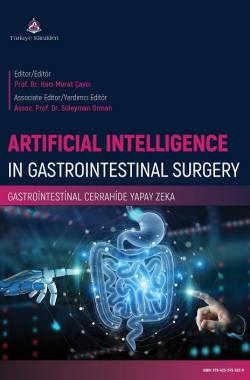ARTIFICIAL INTELLIGENCE (AI) IN THE MANAGEMENT OF COLON DISEASES: NEW HORIZONS
Mehmet Torun
Erzurum State Hospital, Department of Gastroenterology Surgery, Erzurum, Türkiye
Torun M. Artificial Intelligence (AI) in the Management of Colon Diseases: New Horizons. Çaycı HM, ed. Artificial Intelligence (AI) in Gastrointestinal Surgery. 1st ed. Ankara: Türkiye Klinikleri; 2025. p.63-70.
ABSTRACT
Colon diseases are among the most common health problems worldwide, often leading to significant health complications. Conditions such as colorectal cancer, inflammatory bowel diseases (IBD), and irritable bowel syndrome (IBS) are complex disorders that require early diagnosis and effective treatment. In recent years, artificial intelligence (AI) has brought revolutionary advancements to healthcare, offering transformative solutions in the diagnosis, treatment, and management of colon diseases. AI-assisted colonoscopy systems provide higher accuracy in polyp detection compared to traditional methods and aid in making accurate biopsy decisions. In the management of inflammatory bowel diseases, AI is used to predict disease progression, anticipate flare-ups, and develop personalized treatment plans. In the field of microbiota analysis, AI accurately analyzes microbial changes affecting colon health, enabling the prediction of disease risks. Furthermore, AI plays a critical role in proctology, contributing to imaging and surgical treatment in conditions such as anal fistulas and rectal cancer. In colorectal cancer treatment, AI is employed in a wide range of applications, from radiotherapy planning to drug discovery. However, ethical and legal concerns, such as patient privacy and accountability for AI outcomes, remain significant barriers to widespread adoption. This study explores the role of AI in the diagnosis, treatment, and management of colon diseases, evaluating current applications and future potential. The integration of AI technologies holds the promise of revolutionary improvements in the management of colon diseases.
Keywords: Artificial intelligence (AI); Colorectal cancer; Inflammatory bowel diseases; Colonoscopy; Microbiota
Kaynak Göster
Referanslar
- Topol EJ. Deep medicine: how artificial intelligence can make healthcare human again. Basic Books; 2019. [Link]
- World Health Organization. Cancer fact sheet [Internet]. 2024 [cited 2024 Dec]. Available from: [Link]
- Hassan C, Wallace MB, Sharma P, et al. Artificial intelligence for colorectal polyp detection: moving towards real-time colonoscopy. Gut. 2020;69(5):830-9. [Crossref] [PubMed]
- Urban G, Tripathi P, Middendorf M, et al. Deep learning for real-time colonoscopy polyp detection. J Med Imaging.2018;5(3):036001. [Link]
- Wang P, Xiao X, Glissen Brown JR, et al. AI-assisted endoscopic detection of colorectal lesions. Gastroenterology. 2021;160(4):951-4. [Link]
- Nguyen NH, Picetti D, Dulai PS, et al. Machine Learning-based Prediction Models for Diagnosis and Prognosis in Inflammatory Bowel Diseases: A Systematic Review. J Crohns Colitis. 2022;16(3):398-413. [Crossref] [PubMed] [PMC]
- Ahmad HA, East JE, Panaccione R, et al. Artificial intelligence in inflammatory bowel disease: implications for clinical practice and future directions. Intest Res. 2023;21(3):283-294. [Crossref] [PubMed] [PMC]
- Qin J, Li Y, Cai Z, et al. A metagenome-wide association study of gut microbiota in type 2 diabetes. Nature. 2012;490(7418):55-60. [Link]
- Zhernakova A, Kurilshikov A, Bonder MJ, et al. Population-based metagenomics analysis reveals markers for gut microbiome composition and diversity. Science. 2016;352(6285):565-569. [Crossref] [PubMed] [PMC]
- Murcia Pienkowski V, Skoczylas P, Zaremba A, et al. Harnessing the power of AI in precision medicine: NGS-based therapeutic insights for colorectal cancer cohort. Front Oncol. 2024;14:1407465. [Crossref] [PubMed] [PMC]
- Ferrucci D, Brown E, Chu-Carroll J, et al. Watson: AI for medical research. IBM J Res Dev. 2020;64(1/2):10:1-10:12. [Link]
- Morley J, Machado CCV, Burr C, et al. The ethics of AI in health care: A mapping review. Soc Sci Med. 2020;260:113172. [Crossref] [PubMed]
- Naik N, Hameed BMZ, Shetty DK, et al. Legal and Ethical Consideration in Artificial Intelligence in Healthcare: Who Takes Responsibility?. Front Surg. 2022;9:862322. Published 2022 Mar 14. [Crossref] [PubMed] [PMC]

